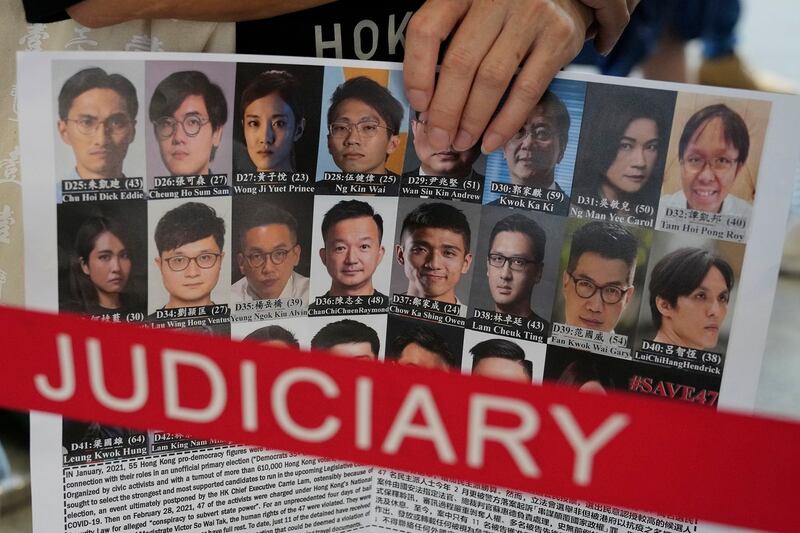Hong Kong's national security police used a fake social media account to troll pro-democracy activists for years, according to information revealed during a "subversion" trial of 47 pro-democracy activists who took part in a 2020 democratic primary and further investigated by Radio Free Asia.
An investigator called to testify in the trial said officers had used a Facebook account in the name of "Tang Ki" to monitor the online activity of the former lawmakers and political activists currently standing trial for "subversion" under a national security law imposed on the city by Beijing.
The officer told the West Kowloon Magistrate’s Court that the account was created to “gather evidence” against suspects, but had apparently misremembered the exact name.
Local media reports later identified the account in question, which has since been deleted, as actually being in the name "Tang Hon Kei."
The same account was later found to have also been used to issue threats, commenting on a post by former law professor Benny Tai that he would face "divine punishment" for organizing the primary election, which aimed to pick the best candidates to win a majority of seats in the 2020 Legislative Council elections.
The revelations about the account's activity have raised concerns about how the police are using the billions of Hong Kong dollars given to them by the government to "safeguard national security,” while echoing the tactics deployed by the ruling Communist Party around the world.
Current affairs commentator Sang Pu said the deletion of the police account was suspicious.
"If it was all above board, then why delete it?" he said. "They're a law enforcement agency -- what are they afraid of?"
Anime profile photo
A search of cached Facebook pages showed that the account once had an anime profile picture, and claimed to belong to a construction and architecture student at Hong Kong’s Polytechnic University, but little other content was visible other than a single family photo.
Hong Kong's IndyMedia news website reported that the account only had five friends, and had previously liked a page belonging to the business of Lai Chen-bong, who is awaiting trial on "terrorism" charges.
However, further online searches revealed that the Tang Hon Kei account began targeting pro-democracy activists as early as 2016, including former 2014 protest leader Joshua Wong.

The account commented negatively on Wong's trip to Thailand, where he was detained by Thai police for 10 hours and denied permission to enter the country.
"You don't have a proper job ... and you don't have to get up early every day," the account commented. "A lot of people in Hong Kong have to get up early to go to work, dammit!"
In April 2017, then opposition lawmaker Nathan Law commented on a movie that had been banned in mainland China, and the account commented: "It's a riot, why don't you watch it?"
The number of comments rose sharply after the ruling Chinese Communist Party imposed the national security law on Hong Kong citing the need to restore order in the wake of the 2019 protest movement, which Beijing said was an attempt by "foreign forces" to foment a "color revolution" in the city.
The police Facebook account commented several times on posts made by activists and candidates in the 2020 primary election, asking activist and singer Denise Ho "you piece of sh*t, why aren't you dead yet?"
Similar to troll farms
Its activity showed strong parallels with the way pro-government trolls operate in mainland China, according to Sang Pu.
"The use of a pseudonym is very similar to the methods used by content farms in China, so it's not just the Hong Kong police, the Hong Kong government or the Hong Kong national security police," he said.
He said such comments form part of a "strategic" and coordinated campaign by the authorities to influence public opinion.
"It's not just a matter of someone making 50 cents by posting something online [in support of the government]," Sang said in a reference to China's online army of pro-government trolls, who have been dubbed the " Little Pinks," or the " 50 cent army."
"These are strategic actions and provocations ... that create a chilling effect, and remind the public that the national security police are watching everything they do and say online," he said.
Hong Kong security secretary Chris Tang, a former police chief, declined to comment on "ongoing cases" when asked by journalists to comment on the police use of social media accounts on Monday.
"All police officers' actions are carried out in accordance with the law," he said.
China has long used social media networks like Twitter to spread positive propaganda about the ruling Communist Party, according to press freedom groups and social media companies.
In August 2020, Google removed 2,500 fake YouTube accounts linked to China, with Facebook following suit in September 2020, taking down around 180 similar accounts, according to the International Federation of Journalists.
A 2022 investigation by Radio Free Asia affiliate WhyNot found that much of the abuse on the Chinese internet is perpetrated by government agencies or state-backed media platforms.
"The abusers smear targets, stoking emotional nationalism among Chinese netizens, producing media storms, harvesting enormous online engagement, and profiting from their cruelty," the report said.
Sixteen defendants are currently standing trial after pleading not guilty to charges of "incitement to subvert state power" over the primary, soon after which the government postponed the elections and rewrote the rulebook to ensure only that opposition candidates couldn't stand.
The remainder, including Benny Tai, Joshua Wong and journalist-turned-lawmaker Claudia Mo, have pleaded guilty. All defendants could face life imprisonment.
Translated by Luisetta Mudie. Edited by Malcolm Foster.
